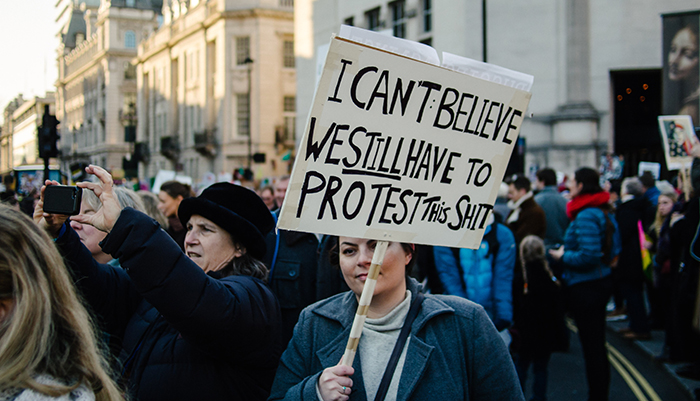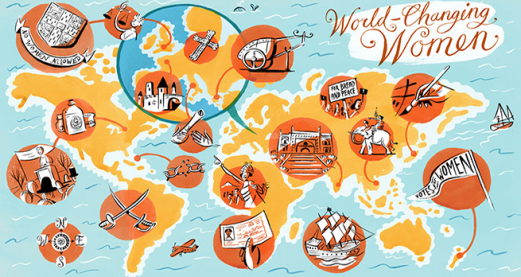 Women's March 2017 London
Women's March 2017 London
“I can’t believe we still have to protest this shit,” proclaimed a multitude of signs at a protest in London on January 21 2017. These signs, and others, were photographed, filtered, edited and uploaded to social media, linking protesters around the globe. ![]()
The protests, which spread from the initial Women’s March on Washington, spurred by the election of Donald Trump as president of the United States, resulted in what was allegedly the largest day of protests in US history.
That it was a triumph of activism for and by women is beyond doubt. But the fact that we do still have to protest this shit speaks to the incredulity at what is happening. This is not “normal”. The persistence of misogyny and sexism, the need to march, to come together, to rally, to campaign yet again.
This apparently Sisyphean task brings us to March 8 2017, when in honour of International Women’s Day, protests have, once again, been organised in more than 30 countries. The day is “a global day celebrating the social, economic, cultural and political achievements of women”. With roots that reach back over a century, its focus is firmly on the future. This year, however, there is a palpable concern that the direction of travel may be reversing.
Does this have to be the new normal?
One of the sparks for the recent rise in mass protest was powerfully brought to life before the 2016 US election by Michelle Obama. The then first lady declared that she had been “shaken to her core” by Trump’s lewd description of his treatment of women. When she asked us what lessons our children would learn from the behaviour of this influential man she made explicit, as feminists have long done, the link between the personal and the political.
Every minute of Michelle Obama’s 30 minute speech today is worth watching. https://t.co/ZlEX3YaU6a
— Hillary Clinton (@HillaryClinton) October 13, 2016
Political discourse is rarely casual. Political speeches are carefully crafted pieces of rhetoric. And so, without ever naming him, Obama told us that if Trump won the election we would be “telling our sons that it’s okay to humiliate women” and “telling our daughters that this is how they deserve to be treated.”
He then, of course, went on to win that election. So what now? How do we explain these events to our children – both boys and girls? How do we deal with the disappointment of the next generation when their expectations of gender equity are not met?
What we have seen in recent times is a generation of women who have grown to expect equality – to be allowed to succeed academically, to progress professionally, to nurture families and to live public lives unimpeded by discrimination.
Frequently, however, they fail to experience it as a uniform reality. With his vulgarities, President Trump endorses positions of feminine passivity and masculine power that underpin sexual harassment. He reminds us that men grab and women are grabbed.
Everyone’s problem
Trump’s presentation of femininity doesn’t only affect women. Every time men are assumed to be natural sexual predators, the complexities of gender are ignored – those aspects of identity that are feminine and masculine for everyone, those times when sex wasn’t wanted, those times when speaking about an unwanted experience was curtailed by the idea that men are predators, women are victims.
We know that the circulation of misogynist and anti-feminist sentiment is not uncommon – indeed online trolling is rife. For years now, feminists have been abused, belittled and physically threatened across social media platforms. Some are speaking back.
At the same time feminist ideas are becoming increasingly mainstream. Sites such as Everyday Feminism and Feministing have certainly captured the public interest and, particularly, that of young women. Celebrities support it) and magazines we once associated with traditional femininities now tell us that feminism is cool. To this we can add the complex political events of the last 12 months, which appear to have had a “radicalising” effect on activists.
Invariably, around International Women’s Day, people ask whether feminism is redundant. Don’t the women of the Western world already have equal rights? Do we still have to protest this shit? When the most powerful man in the world thinks “you can do anything” to women, the answer can only be yes.
This article was originally published on The Conversation. Read the original article.


Rate and Review
Rate this video
Review this video
Log into OpenLearn to leave reviews and join in the conversation.
Video reviews